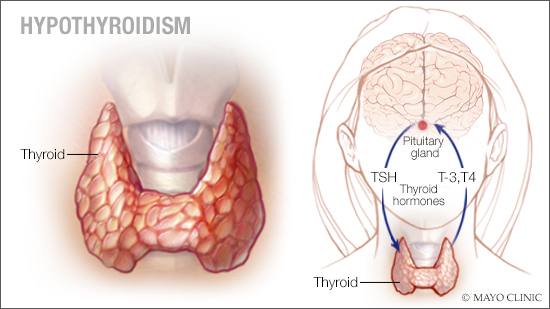-
Health & Wellness
Mayo Clinic Q and A: Hypothyroidism and dietary challenges

DEAR MAYO CLINIC: I was recently diagnosed with hypothyroidism and have been getting conflicting information on what I should eat and drink. I love yogurt and ice cream, for instance, but one source said a calcium-rich diet was fine, whereas another said I should limit dairy. I’ve also read that I should avoid soy and iodine. But then a friend told me iodine is helpful. Can you give me some guidance on the best diet to manage my condition?
ANSWER: Hypothyroidism, or underactive thyroid, is a condition in which your thyroid gland doesn't produce enough of certain crucial hormones. If you are diagnosed with hypothyroidism, you should take a thyroid hormone replacement as directed by your health care provider. Medication can be taken at any time that's best for you, and it is okay to take it on an empty stomach or with food, as long as you do the same thing every day.
Generally, there's no hypothyroidism diet. Although claims about hypothyroidism diets abound, there's no evidence that eating or avoiding certain foods will improve thyroid function in people with hypothyroidism.
It is true that iodine deficiency can cause hypothyroidism. But in developed countries, including the U.S., thyroid disease from iodine deficiency has been nearly eliminated by iodine additives in salt and food. While some alternative medicine practitioners recommend iodine tablets or kelp supplements, which are high in iodine, for people with hypothyroidism, eating a balanced diet makes taking supplemental iodine unnecessary. In fact, too much iodine can cause hyperthyroidism in some people.
Other supplements such as soy, taken in large amounts, may have an impact on thyroid hormone production but won't cause hypothyroidism in people who are not also iodine deficient.
Whether people who have hypothyroidism should avoid soy is a topic of debate. Soy has long been thought to interfere with the body’s ability to absorb synthetic thyroid hormone, which most people with hypothyroidism are prescribed. However, there's no evidence that people who have hypothyroidism should avoid soy completely.
Generally, it's best to wait four hours after taking thyroid medication to consume any products that contain soy. The same guidelines apply to other products that may impair the body's ability to absorb thyroid medication, including concentrated iron and calcium supplements, and antacids that contain calcium or aluminum hydroxide.
Calcium in and of itself is not harmful for patients with hypothyroidism to consume. It is calcium supplements or antacids containing calcium that can interfere with the absorption of thyroid hormone replacement medications, such as the synthetic thyroid hormones levothyroxine (Synthroid, Unithroid, others) and liothyronine (Cytomel), as well as thyroid extract supplements.
This interference happens chiefly if you take thyroid hormone replacement and calcium supplements at or near the same time. Other supplements, including those containing magnesium and iron, can have the same effect. In addition, proton pump inhibitors and some cholesterol-lowering drugs, such as those containing cholestyramine (Prevalite) and colestipol (Colestid), may affect absorption as well.
To prevent potential interactions, use these products several hours before or after you take your thyroid medication.
Additionally, certain foods, such as walnuts or an excess of dietary fiber, also can impair the absorption of thyroid hormone replacement medication.
The best recommendation for effectively managing hypothyroidism is to take your medication as directed and avoid dietary extremes. If you have concerns, talk with your health care provider about taking a multivitamin with minerals. — Dr. Todd Nippoldt, Endocrinology, Mayo Clinic, Rochester, Minnesota
****************************
Related Articles
- Mayo Clinic Q and A: Mild hypothyroidism may not need treatment published 9/17/19
- Study finds similar cardiovascular outcomes for generic, brand-name drugs for hypothyroidism published 6/19/19
Related Articles







